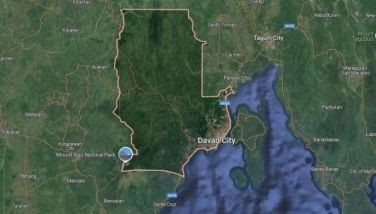NFA to issue P8-B LT notes to fund procurement program
October 27, 2005 | 12:00am
The cash-strapped state-run National Food Authority (NFA) will issue P8 billion worth of long-term notes to fund its local rice procurement program and its increasing rice importation requirements.
NFA has appointed the Land Bank of the Philippines (Landbank) as lead arranger and issue manager of the agency’s issuance of long-term notes.
The long-term notes will be backed by seven-year zero-coupons bonds issued by the government while the interest will be covered by a guarantee from the Department of Finance (DOF).
NFA said four other banks participated in the syndication agreement, namely, Equitable PCI Bank, Development Bank of the Philippines, Philippine National Bank, and Philippine Veterans Bank.
This would be the second consecutive year that the NFA has tapped Landbank to arrange and executive a similar loan facility. In April 2004, Landbank funded NFA’s entire P5-billion issue.
NFA, the grains trading arm of the Department of Agriculture (DA) has the twin mandate of buying grains at above market prices from farmers and distributing these at cheaper prices to consumers.
The agency is mostly involved in the trading of rice and corn. It implements the government’s rice support program by buying palay from farmers and selling these at subsidized prices in strategic areas to stabilize prices.
At the same time, NFA is mandated to handle the country’s rice import program.
Its conflicting tasks have caused NFA to absorb losses of as much as P7 billion annually. With inadequate budgetary support, the NFA is finding it more difficult to fund its programs and has been relying on commercial loans to carry out its mandate.
The NFA is planning to streamline its operations and is now in the process of reviewing its organization structure and create schemes to improve operations and efficiencies and to cut losses.
Previously, NFA Administrator Gregorio Tan Jr. admitted that it has become increasingly difficult for the agency to implement a rice subsidy scheme for both rice and corn farmers while at the same time, satisfying the demands of consumers for affordable rice.
Its dire financial straits is expected to take a turn for the worse because in recent years, it has become more expensive to import rice, especially with escalating world market prices of rice while trading and distribution costs are increasing with the spike in prices of crude oil.
The NFA this year is importing a total of 1.8 million metric tons of rice, the highest since the 1997-1998 level of 2.1 million metric tons when the long dry spell brought about by the El Niño phenomenon forced government to increase its rice imports. This year’s total rice imports is estimated to cost about P27 billion based on the average import price of $280 per metric ton.
The NFA’s finances are also saddled with the huge cost of maintaining about 8.7 million bags of rice in its warehouses, numbering 300 nationwide, it has 79 regional offices and one central office.
Former Finance Secretary Cesar Purisima said the NFA needs to restructure to ease the weight of its impact on the government’s consolidated public sector deficit.
Former Budget Secretary Emilia Boncodin said NFA has long been a concern among budget planners but the executive decision has yet to be made on how to best rationalize NFA’s functions.
There are several bills like House Bill 273 filed by Speaker Jose de Venecia which seeks to abolish the rice stabilization functions of NFA.
In the Senate, Senator Ramon Magsasay Jr. who heads the committee on agriculture also last year called for the privatization of NFA.
Previously, the NFAEA officials said the agency’s poor financial condition is also due to its huge payments for tariffs on rice importation.
"A closer look at these losses shows that for three decades, the NFA waived tariff for rice importation as provided for by its charter and it was only in 2002 when the government started charging a 50-percent tariff on rice importation. The NFA paid staggering amounts of around P5 billion and P7 billion in 2003 and 2003, respectively," NFAEA said.
It added that with insufficient funds to pay tariff charges, the NFA had to resort to borrowings from commercial banks that yield high interest rates.
NFA has appointed the Land Bank of the Philippines (Landbank) as lead arranger and issue manager of the agency’s issuance of long-term notes.
The long-term notes will be backed by seven-year zero-coupons bonds issued by the government while the interest will be covered by a guarantee from the Department of Finance (DOF).
NFA said four other banks participated in the syndication agreement, namely, Equitable PCI Bank, Development Bank of the Philippines, Philippine National Bank, and Philippine Veterans Bank.
This would be the second consecutive year that the NFA has tapped Landbank to arrange and executive a similar loan facility. In April 2004, Landbank funded NFA’s entire P5-billion issue.
NFA, the grains trading arm of the Department of Agriculture (DA) has the twin mandate of buying grains at above market prices from farmers and distributing these at cheaper prices to consumers.
The agency is mostly involved in the trading of rice and corn. It implements the government’s rice support program by buying palay from farmers and selling these at subsidized prices in strategic areas to stabilize prices.
At the same time, NFA is mandated to handle the country’s rice import program.
Its conflicting tasks have caused NFA to absorb losses of as much as P7 billion annually. With inadequate budgetary support, the NFA is finding it more difficult to fund its programs and has been relying on commercial loans to carry out its mandate.
The NFA is planning to streamline its operations and is now in the process of reviewing its organization structure and create schemes to improve operations and efficiencies and to cut losses.
Previously, NFA Administrator Gregorio Tan Jr. admitted that it has become increasingly difficult for the agency to implement a rice subsidy scheme for both rice and corn farmers while at the same time, satisfying the demands of consumers for affordable rice.
Its dire financial straits is expected to take a turn for the worse because in recent years, it has become more expensive to import rice, especially with escalating world market prices of rice while trading and distribution costs are increasing with the spike in prices of crude oil.
The NFA this year is importing a total of 1.8 million metric tons of rice, the highest since the 1997-1998 level of 2.1 million metric tons when the long dry spell brought about by the El Niño phenomenon forced government to increase its rice imports. This year’s total rice imports is estimated to cost about P27 billion based on the average import price of $280 per metric ton.
The NFA’s finances are also saddled with the huge cost of maintaining about 8.7 million bags of rice in its warehouses, numbering 300 nationwide, it has 79 regional offices and one central office.
Former Finance Secretary Cesar Purisima said the NFA needs to restructure to ease the weight of its impact on the government’s consolidated public sector deficit.
Former Budget Secretary Emilia Boncodin said NFA has long been a concern among budget planners but the executive decision has yet to be made on how to best rationalize NFA’s functions.
There are several bills like House Bill 273 filed by Speaker Jose de Venecia which seeks to abolish the rice stabilization functions of NFA.
In the Senate, Senator Ramon Magsasay Jr. who heads the committee on agriculture also last year called for the privatization of NFA.
Previously, the NFAEA officials said the agency’s poor financial condition is also due to its huge payments for tariffs on rice importation.
"A closer look at these losses shows that for three decades, the NFA waived tariff for rice importation as provided for by its charter and it was only in 2002 when the government started charging a 50-percent tariff on rice importation. The NFA paid staggering amounts of around P5 billion and P7 billion in 2003 and 2003, respectively," NFAEA said.
It added that with insufficient funds to pay tariff charges, the NFA had to resort to borrowings from commercial banks that yield high interest rates.
BrandSpace Articles
<
>
- Latest
- Trending
Trending
Latest
Trending
Latest
Recommended





























